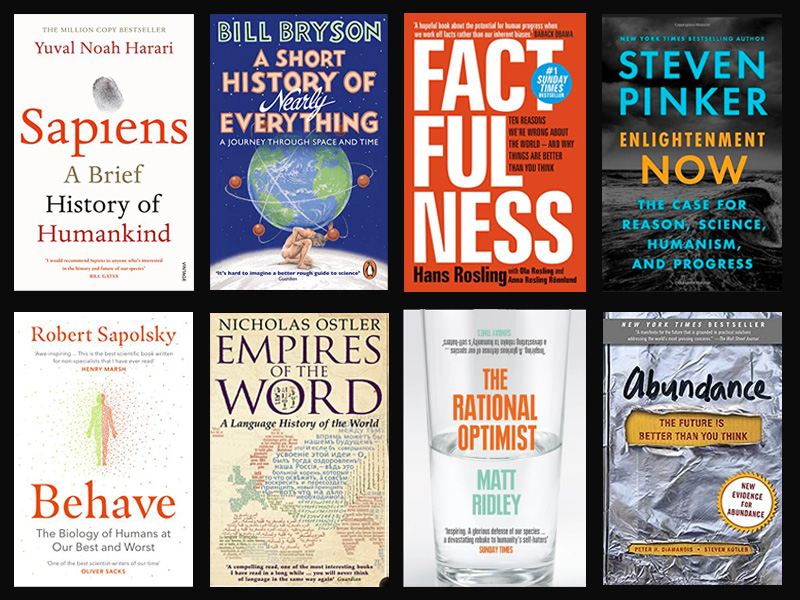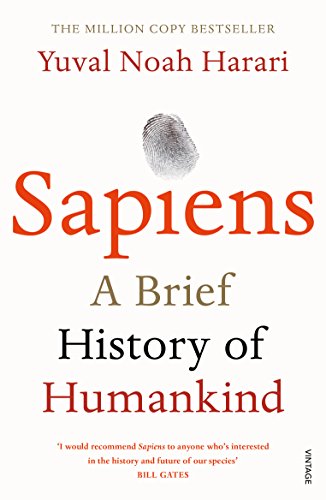I read a lot - one book per week in average this year, and almost exclusively non-fiction books. You can find the list of the books I read on Libib, which has just reached 300 volumes (excluding textbooks, guidebooks and the like). Of all the books I have read, these 10 books are the most important for anyone to read to understand where we come from, how the world really is today and where it is going. They are the greatest compendium of knowledge necessary for life in the early 21st century. Enjoy!

Understanding where we come from
Sapiens: A Brief History of Humankind, by Yuval Noah Harari

Yuval Harari retraces the history of humankind in a very unique and enlightening fashion. One of the best history books in recent years. Particularly fascinating for anyone interested in human evolution and what enabled the rise of civilisations.
A Short History of Nearly Everything, by Bill Bryson

Probably the best, most readable and most entertaining history of science and technology ever written. This book should be read by all students in all schools worldwide.
Understanding our body
The Body: a Guide for Occupants, by Bill Bryson
A great review of human biology, covering everything one should know: the brain, hormones, the microbiome, the immune system, digestion, nutrition, the skeleton and much more. As usual Bill Bryson writes in a clear and entertaining way that makes it suitable for everyone.

Understanding human nature
Behave: The Biology of Humans at Our Best and Worst, by Robert Sapolsky
A monumental book explaining what makes us think and behave the way we do based on the latest understanding of neuroscience, genetics, psychology and anthropology.

Social Intelligence: The New Science of Human Relationships, by Daniel Goldeman

Understand people and how to interact successfully with them. Understand why emotions are contagious, how empathy works, how the brain manages our feelings...
Understanding why there are so many languages in the world
Empires of the Word: A Language History of the World, by Nicholas Ostler

The best book I have read about the history of world languages, how languages evolve and why some languages succeed or fail in supplanting others.
Understanding how ideas evolve
The Evolution of Everything: How Ideas Emerge, by Matt Ridley

Matt Ridley explains how all human systems and ideas evolve over time by a process not unlike natural evolution, including by natural selection. The economy, technologies, society, political systems, mores, and even religions all evolve this way. This is perhaps Matt Ridley's most important work as it summarizes all his ideas and theories and applies them to all every facet of human society.
Understanding today's world
Factfulness: Ten Reasons We're Wrong About the World--and Why Things Are Better Than You Think, by Hans Rosling

Rosling suggests that the vast majority of human beings, including experts, have an outdated or distorted view about the state of the world. He shows that his test subjects think the world is poorer, less healthy, and more dangerous than it is. In his famous Ignorance Project, the author demonstrated that university students and professors alike scored worse than chimpanzees in answering 10 basic questions about the state of the world, such as what is the global vaccination rate and what is the life expectancy of the world population. You can try the test on CNN's website.
The Rational Optimist, by Matt Ridley

This book makes a very good case of why we shouldn't pay too much attention to the alarming headlines in the news and should instead think, for good reasons, that most of the world's problems will work themselves out. A great read for anyone interested in history, society and economy.
Enlightenment Now: The Case for Reason, Science, Humanism, and Progress, by Steven Pinker

Steven Pinker masterfully demonstrates how our world keeps getting better thanks to human intelligence and ingenuity. His leitmotiv is that the Enlightenment values of reason, science, and humanism generated progress and he illustrates this progress with data that health, prosperity, safety, peace, and happiness worldwide.
Understanding where the world is going
Homo Deus: A Brief History of Tomorrow, by Yuval Noah Harari

The continuation of Sapiens, Homo Deus looks at the future of humanity, how new technologies and the demise of religions will reshape our values, lifestyle and what it means to be human.
Abundance: The Future Is Better Than You Think, by Peter Diamandis

Many people fear that the growing global population combined with global warming will lead to humanitarian catastrophes and famines. There is ample evidence that we are on the contrary heading toward a society of abundance worldwide like never before in human history (even now).

Understanding where we come from
Sapiens: A Brief History of Humankind, by Yuval Noah Harari

Yuval Harari retraces the history of humankind in a very unique and enlightening fashion. One of the best history books in recent years. Particularly fascinating for anyone interested in human evolution and what enabled the rise of civilisations.
A Short History of Nearly Everything, by Bill Bryson

Probably the best, most readable and most entertaining history of science and technology ever written. This book should be read by all students in all schools worldwide.
Understanding our body
The Body: a Guide for Occupants, by Bill Bryson
A great review of human biology, covering everything one should know: the brain, hormones, the microbiome, the immune system, digestion, nutrition, the skeleton and much more. As usual Bill Bryson writes in a clear and entertaining way that makes it suitable for everyone.

Understanding human nature
Behave: The Biology of Humans at Our Best and Worst, by Robert Sapolsky
A monumental book explaining what makes us think and behave the way we do based on the latest understanding of neuroscience, genetics, psychology and anthropology.

Social Intelligence: The New Science of Human Relationships, by Daniel Goldeman

Understand people and how to interact successfully with them. Understand why emotions are contagious, how empathy works, how the brain manages our feelings...
Understanding why there are so many languages in the world
Empires of the Word: A Language History of the World, by Nicholas Ostler

The best book I have read about the history of world languages, how languages evolve and why some languages succeed or fail in supplanting others.
Understanding how ideas evolve
The Evolution of Everything: How Ideas Emerge, by Matt Ridley

Matt Ridley explains how all human systems and ideas evolve over time by a process not unlike natural evolution, including by natural selection. The economy, technologies, society, political systems, mores, and even religions all evolve this way. This is perhaps Matt Ridley's most important work as it summarizes all his ideas and theories and applies them to all every facet of human society.
Understanding today's world
Factfulness: Ten Reasons We're Wrong About the World--and Why Things Are Better Than You Think, by Hans Rosling

Rosling suggests that the vast majority of human beings, including experts, have an outdated or distorted view about the state of the world. He shows that his test subjects think the world is poorer, less healthy, and more dangerous than it is. In his famous Ignorance Project, the author demonstrated that university students and professors alike scored worse than chimpanzees in answering 10 basic questions about the state of the world, such as what is the global vaccination rate and what is the life expectancy of the world population. You can try the test on CNN's website.
The Rational Optimist, by Matt Ridley

This book makes a very good case of why we shouldn't pay too much attention to the alarming headlines in the news and should instead think, for good reasons, that most of the world's problems will work themselves out. A great read for anyone interested in history, society and economy.
Enlightenment Now: The Case for Reason, Science, Humanism, and Progress, by Steven Pinker

Steven Pinker masterfully demonstrates how our world keeps getting better thanks to human intelligence and ingenuity. His leitmotiv is that the Enlightenment values of reason, science, and humanism generated progress and he illustrates this progress with data that health, prosperity, safety, peace, and happiness worldwide.
Understanding where the world is going
Homo Deus: A Brief History of Tomorrow, by Yuval Noah Harari

The continuation of Sapiens, Homo Deus looks at the future of humanity, how new technologies and the demise of religions will reshape our values, lifestyle and what it means to be human.
Abundance: The Future Is Better Than You Think, by Peter Diamandis

Many people fear that the growing global population combined with global warming will lead to humanitarian catastrophes and famines. There is ample evidence that we are on the contrary heading toward a society of abundance worldwide like never before in human history (even now).
Last edited:

